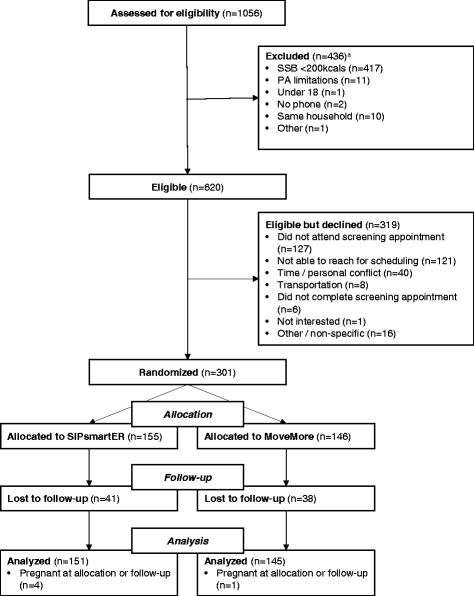Effects of a behavioral and health literacy intervention to reduce sugar-sweetened beverages: a randomized-controlled trial
- PMID: 27000402
- PMCID: PMC4802861
- DOI: 10.1186/s12966-016-0362-1
Effects of a behavioral and health literacy intervention to reduce sugar-sweetened beverages: a randomized-controlled trial
Abstract
Background: Despite excessive consumption of sugar-sweetened beverages (SSB), little is known about behavioral interventions to reduce SSB intake among adults, particularly in medically-underserved rural communities. This type 1 effectiveness-implementation hybrid RCT, conducted in 2012-2014, applied the RE-AIM framework and was designed to assess the effectiveness of a behavioral intervention targeting SSB consumption (SIPsmartER) when compared to an intervention targeting physical activity (MoveMore) and to determine if health literacy influenced retention, engagement or outcomes.
Methods: Guided by the Theory of Planned Behavior and health literacy strategies, the 6 month multi-component intervention for both conditions included three small-group classes, one live teach-back call, and 11 interactive voice response calls. Validated measures were used to assess SSB consumption (primary outcome) and all secondary outcomes including physical activity behaviors, theory-based constructs, quality of life, media literacy, anthropometric, and biological outcomes.
Results: Targeting a medically-underserved rural region in southwest Virginia, 1056 adult participants were screened, 620 (59%) eligible, 301 (49%) enrolled and randomized, and 296 included in these 2015 analyses. Participants were 93% Caucasian, 81% female, 31 % ≤ high-school educated, 43% < $14,999 household income, and 33% low health literate. Retention rates (74%) and program engagement was not statistically different between conditions. Compared to MoveMore, SIPsmartER participants significantly decreased SSB kcals and BMI at 6 months. SIPsmartER participants significantly decreased SSB intake by 227 (95% CI = -326,-127, p < 0.001) kcals/day from baseline to 6 months when compared to the decrease of 53 (95% CI = -88,-17, p < 0.01) kcals/day among MoveMore participants (p < 0.001). SIPsmartER participants decreased BMI by 0.21 (95% CI = -0.35,-0.06; p < 0.01) kg/m(2) from baseline to 6 months when compared to the non-significant 0.10 (95 % CI = -0.23, 0.43; NS) kg/m(2) gain among MoveMore participants (p < 0.05). Significant 0-6 month effects were observed for about half of the theory-based constructs, but for no biological outcomes. Health literacy status did not influence retention rates, engagement or outcomes.
Conclusions: SIPsmartER is an effective intervention to decrease SSB consumption among adults and is promising for translation into practice settings. SIPsmartER also yielded small, yet significant, improvements in BMI. By using health literacy-focused strategies, the intervention was robust in achieving reductions for participants of varying health literacy status.
Trial registration: Clinicaltrials.gov; ID: NCT02193009 .
Keywords: Behavioral research; Beverages; Health literacy; Randomized controlled trial; Rural population.
Figures
References
-
- Sharkey JR, Johnson CM, Dean WR. Less-healthy eating behaviors have a greater association with a high level of sugar-sweetened beverage consumption among rural adults than among urban adults. Food Nutr Res. 2011;55 http://www.ncbi.nlm.nih.gov/pmc/articles/PMC3153312/. - PMC - PubMed
-
- Zoellner J, You W, Connell C, Smith-Ray RL, Allen K, Tucker KL, et al. Health literacy is associated with healthy eating index scores and sugar-sweetened beverage intake: findings from the rural lower mississippi delta. J Am Diet Assoc. 2011;111:1012–1020. doi: 10.1016/j.jada.2011.04.010. - DOI - PMC - PubMed
Publication types
MeSH terms
Substances
Associated data
Grants and funding
LinkOut - more resources
Full Text Sources
Other Literature Sources
Medical
Miscellaneous


